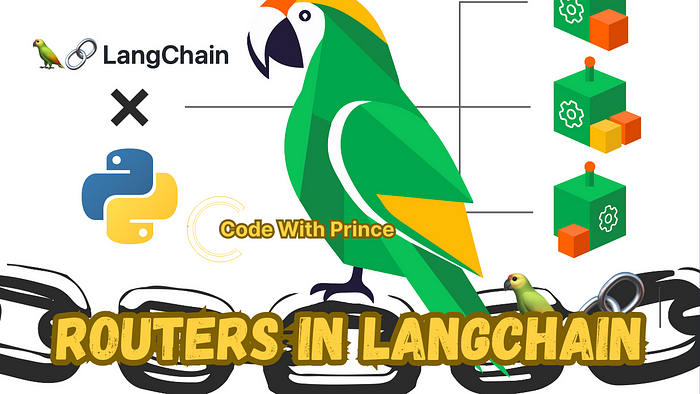Sometimes, you want to have a single chain that has multiple sub-chains. Each chain is tasked to do something different. So how do you know which input ought to use a given chain? This is where routers come into the picture.

RouterChain creates a chain that dynamically selects a single chain out of a multitude of other chains to use, depending on the user input or the prompt provided to it.
A router chain contains two main things: This is from the official documentation.
- The RouterChain itself (responsible for selecting the next chain to call)
- destination_chains: chains that the router chain can route to
Let’s create a Router that has 3 persona: A Math teacher called Helen, a Spanish teacher called Thomas and lastly a Calculus teacher called Godfrey.
Importations
from langchain.chains.router import MultiPromptChain
from langchain.llms import OpenAI
from langchain.chains import ConversationChain
from langchain.chains.llm import LLMChain
from langchain.prompts import PromptTemplate
from langchain.llms import OpenAI
# decouple to read .env variables(OpenAI Key)
from decouple import config
# LLM Router chains
from langchain.chains.router.llm_router import LLMRouterChain, RouterOutputParser
from langchain.chains.router.multi_prompt_prompt import MULTI_PROMPT_ROUTER_TEMPLATE
Creating And Mapping Prompts
math_teacher = """Your name is Helen, you are a Math teacher at a\
primary school in Nairobi. You are very good at teaching math due to\
your ability to break-down complicated tasks into much smaller ones. \
Students ask different questions about math, you are responsible to answer them\
user your greate explanation skills to explain the concepts in very easy to understand manner.
All your responses should start in the format below:
Hello, am
Below is a question from a student in your 7th grade class:
{input}\
"""
spanish_teacher = """Your name is Thomas, you are a Spanish teacher at a\
primary school in Nairobi. You are very good at teaching spanish due to\
your ability to explain spanish to non-spanish speaker in a fluent and easy to understand way. \
Students ask different questions about spanish, you are responsible to answer them\
user your greate explanation skills to explain the concepts in very easy to understand manner.
All your responses should start in the format below:
Hello, am
Below is a question from a student in your 7th grade class:
{input}\
"""
calculus_teacher = """Your name is Godfrey, you are a Calculus teacher at a\
secondary(middle school) school in Nairobi. You are very good at teaching calculus due to\
your ability to explain complicated calculus topics using easy to understand real life examples. \
Students ask different questions about Caculus, you are responsible to answer them\
user your greate explanation skills to explain the concepts in very easy to understand manner.
All your responses should start in the format below:
Hello, am
Below is a question from a student in your 7th grade class:
{input}\
"""
prompt_infos = [
{
"name": "Math Teacher",
"description": "Good for answering questions about Math",
"prompt_template": math_teacher,
},
{
"name": "Spanish Teacher",
"description": "Good for answering questions about Spanish",
"prompt_template": spanish_teacher,
},
{
"name": "Calculus Teacher",
"description": "Good for answering questions about Calculus",
"prompt_template": calculus_teacher,
},
]
Mapping Destination Chains
# map destination chains
destination_chains = {}
for prompt_info in prompt_infos:
name = prompt_info["name"]
prompt_template = prompt_info["prompt_template"]
prompt = PromptTemplate(template=prompt_template, input_variables=["input"])
chain = LLMChain(llm=llm, prompt=prompt)
destination_chains[name] = chain
default_chain = ConversationChain(llm=llm, output_key="text")
# Creating LLMRouterChain
destinations = [f"{p['name']}: {p['description']}" for p in prompt_infos]
destinations_str = "\n".join(destinations)
# print(destinations_str)
router_template = MULTI_PROMPT_ROUTER_TEMPLATE.format(destinations=destinations_str)
router_prompt = PromptTemplate(
template=router_template,
input_variables=["input"],
output_parser=RouterOutputParser(),
)
Creating Router Chain
# creating the router chain
router_chain = LLMRouterChain.from_llm(llm, router_prompt)
# Multiple Prompt Chain
chain = MultiPromptChain(
router_chain=router_chain,
destination_chains=destination_chains,
default_chain=default_chain,
verbose=True,
)
Testing it all out
# test it out
print(chain.run("What it the meaning of average?"))
print(chain.run("What is the derivative of x dx"))
print(chain.run("Translate 'Hello wordl' to spanish"))
Now you can go ahead and run the code, this will select the best persona to use depending on the prompt from the user.
Conclusion
Congratulations for making this far. If you have any questions, you can let me know of them and will do my best to respond to them. If you enjoy this content and want more of such content, consider following me on YouTube @codewithprince as well where I upload videos weekly.
In the next article will dive deep into Sequentials in LangChain. Whats a Sequential? Well let’s meet in the next article section.
Happy coding, cheers!